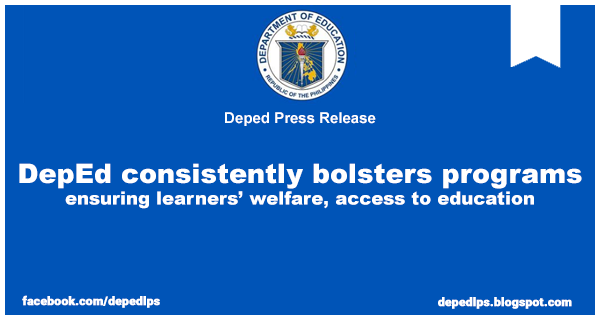
PASIG CITY, November 26, 2017 – The Department of Education (DepEd), through the leadership of Secretary Leonor Magtolis Briones, continues to strengthen programs that ensure learners’ welfare and greater access to quality basic education.
Alternative Learning System
Since her appointment, Briones has been very vocal and persistent in her commitments and advocacies to uplift the educational system in the country, one of which is the expansion of the Alternative Learning System (ALS).
Having personally witnessed efforts from groups and families who went the extra mile to gather children and teach them how to read and write during the war, Briones knew that “one can get educated, even without proper schooling and catch up with those in the formal education system.”
DepEd launched the new K to 12-aligned ALS curriculum in July which will enable ALS learners to easily go from one modality of learning to another—formal to nonformal. This new ALS curriculum was rolled out in the field last September.
Indigenous Peoples Education
The Department responds to the educational needs of Indigenous Peoples (IP) learners by ensuring culture-appropriate learning interventions and resources learners. DepEd adopted the National Indigenous Peoples Education Policy Framework through DepEd Order No. 62, series of 2011. As of School Year (SY) 2016-2017, DepEd has reached 2,929,456 IP learners nationwide.
Special Education
Learners with exceptionalities are not left behind as the Special Education (SPED) Program continues to cater to students with visual impairment, hearing impairment, intellectual disability, autism spectrum disorder, communication disorder, physical disability, emotional and behavioral disorder, multiple disability with visual impairment, and those who are orthopedically handicapped, chronically ill, and the gifted and talented.
To date, DepEd has recognized a total of 658 SPED centers and regular schools offering the program. For SY 2016-2017, there are 166,869 enrollees with special educational needs in elementary and 16,128 in high school.
School-Based Feeding Program
DepEd also continuously improves programs that address hindrances in learners’ participation and performance such as the School-Based Feeding Program (SBFP).
During the recent Senate Committee on Finance Hearing on the DepEd’s 2018 budget, Briones reported an improved performance in the implementation of the SBFP, as well as the plan to increase the number of its target beneficiaries.
The Education chief also noted that in 2016, the SBFP was able to serve 1,800,884 learners out of the 1,918,464 Severely Wasted (SW) and Wasted (W) target beneficiaries from Kindergarten to Grade 6 nationwide.
Noting the success of the program over the past years, DepEd plans to expand the number of beneficiaries and increase the allocated budget for the said program to accommodate the additional student beneficiaries under its 2018 budget.
The SBFP, headed by the DepEd’s Bureau of Learner Support Services-School Health Division (BLSS-SHD), addresses the problem on undernutrition among public school children. It aims to boost classroom attendance by 85% to 100%. It also aims to improve the nutritional status of the beneficiaries by at least 70% at the end of at least 120 feeding days and improve the children’s health and nutritional values and behavior.
Child Protection Policy
DepEd recently made a call to ensure that learners’ best interests are always realized to protect them from abuse and other forms of violence.
At the school level, the Child Protection Committee (CPC) ensures that cases and instances of abuse are closely monitored. This is pursuant to the DepEd Order No. 40, series of 2012, or the DepEd Child Protection Policy, which requires all elementary and secondary schools—both public and private—to create their own CPC.
The CPC is composed of the following: 1) School Head/Administrator as Chairperson; 2) Guidance Counselor/Teacher as Vice Chairperson; 3) Representatives of the teachers as designated by the Faculty Club; 4) Representative of the parents as designated by the Parents-Teachers Association (PTA); 5) Representative of learners as designated by the Supreme Student Council; and 6) Representative from the community as designated by the punong barangay, preferably a member of the Barangay Council for the Protection of Children (BCPC).
Some of the roles of the CPC are: to ensure that learners are following a certain Code of Conduct in schools and that schools have their localized Child Protection Policy; to develop and implement a school-based referral and monitoring system of cases of all forms of abuse and bullying; and to identify, refer, and report cases of child abuse, exploitation, violence, discrimination, and bullying to the appropriate offices if needed, among others.
Likewise, DepEd released the DepEd Order No. 55, s. 2013, or the Implementing Rules and Regulations (IRR) of Republic Act (RA) No. 10627, otherwise known as The Anti-Bullying Act of 2013, which further provides clearer rules on bullying and cyber-bullying. This was reiterated through DepEd Memorandum No. 5, s. 2017, or the Reiteration of the Department of Education Anti-Bullying Policy.
Continuing education in Marawi
Staying true to its commitment in maintaining learners’ safety as the topmost priority, all DepEd Executive Committee (ExeCom) members and other DepEd officials acted expeditiously when the armed conflict in Marawi City erupted last May.
Following various meetings and discussions, the Department issued the DepEd Memorandum No. 98, s. 2017 which provides emergency measures in response to the situation in Marawi. All public schools nationwide were directed to accept displaced Marawi learners even with the unavailability or insufficiency of the required transfer credentials. DepEd has tracked more than 27,000 displaced Marawi learners, and conducted Psychological First Aid (PFA) sessions to help learners, teachers and other personnel re-establish a sense of normalcy.
The Department is now gearing up for the rehabilitation and repair of schools affected by the siege through Brigada Eskwela sa Marawi.
Deped Press Release
Leave a Reply